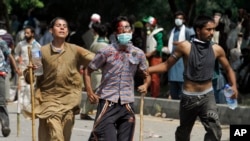Pakistan’s powerful military convened an unprecedented meeting of its top leadership on Sunday, amid continuing clashes between police and protesters who demand that Prime Minister Nawaz Sharif step down. Violence since Saturday has left at least three people dead and more than 400 wounded.
The clashes erupted late Thursday after thousands of protesters tried to storm the building that serves as the office and home for the Pakistani prime minister. Security forces responded by firing tear gas shells and rubber bullets at the demonstrators.
Clashes continued intermittently throughout Sunday as protesters, some armed with clubs and hammers, threw stones at riot police, who fired tear gas.
Ongoing demonstrations
Thousands of protesters have camped out in Islamabad since August 14. They are led by opposition leader Imran Khan and a populist anti-government cleric, Tahir-ul-Qadri. Both want Sharif out of office and for new elections to be held under a reformed national electoral process.
Khan addressed his supporters Sunday night and vowed not to back down unless Sharif steps down. Khan called on his supporters from all over the country to break through barricades to reach the protest zone.
Khan told the rally, “God willing we will confront the police and you need to show the same resolve you demonstrated the other day, despite the massive illegal police crackdown on peaceful protesters.”
On Sunday, Pakistan Army Chief General Raheel Sharif chaired a meeting of his top commanders and warned the government “further use of force will only aggravate” the political unrest.
Military statement
A military statement quoted him as reiterating that the standoff should be resolved politically without wasting any time, and without recourse to violent means. While reaffirming support for democracy, the commander reviewed with serious concerns the existing political crisis and the violent turn it has taken.
Analysts suggest the statement appears to be aimed at dispelling a dominant perception that the military is secretly backing the protests to make way for another coup in Pakistan by exploiting weaknesses of the elected government.
Pakistani police also have attacked television crews and other journalists covering the demonstrations.
The police action has wounded several cameramen with local news channels; some have suffered serious injuries. Television footage shows policemen dragging crew members out of broadcasting vans and beating them with sticks. The violence outraged groups campaigning for journalists’ rights, condemning it as a direct assault on media freedom.
Joint session
A federal minister, Saad Rafique, promised the government will investigate and punish those responsible for the aggression against the media.
"No disciplined force like police can be allowed to carry out such brutal and barbaric assaults," said Rafique, adding that it has "embarrassed the government and weakened its case.”
Prime Minister Sharif, who refuses to step down, convened a meeting of his senior ministers at his official residence Sunday to discuss the political standoff, while the nearby Constitutional Avenue looked like a war zone.
Officials say the meeting condemned mob attacks on “symbols of the state,” calling them undemocratic and unconstitutional. Officials also say they “appreciated” steps the police have taken to defeat protesters’ designs.
The prime minister has decided to convene a joint session of the parliament to discuss the mass protests calling for his ouster, according to officials.




